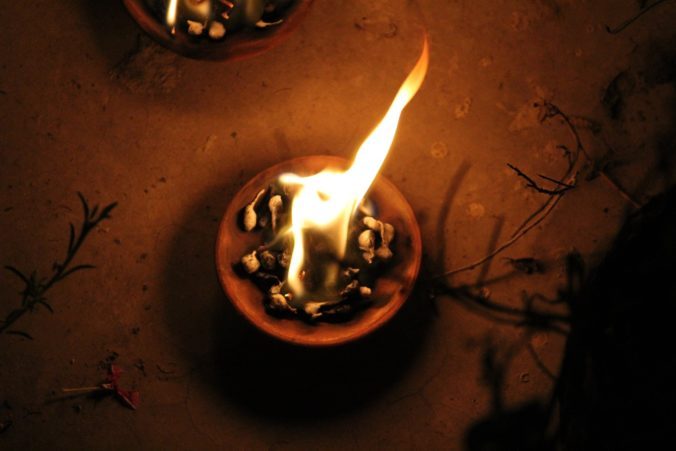It was the eve of diwali. A celebratory joy had taken over the little hillside village of Jyotigram.
With the advent of the evening, the villagers started lighting up earthen lamps in their homes.
Within half an hour, the whole village had a luminous aura around it.
It was a sight to behold.
Even with the sun setting, darkness could not envelop the village. The flickering flames of the hundreds of earthen lamps kept darkness at bay.
Looking over the village from the little hillock was a young boy named Aadi.
He had worn simple clothes, quite unlike the villagers who had worn their best dresses for diwali.
He had a cloth sack hanging across his shoulders.
And even though he looked modest in his appearance, his eyes shone bright as a full moon on a clear night.
‘What are you doing here son?’ asked a silhouette in the dark.
It was an elderly man called Harish, a photographer from the city who’d come to village to capture the festivity of Diwali.
Aadi recognized him. He had seen the man come to the village a couple of days ago with his camera.
‘I am just enjoying the view of my village all lit up on the eve of Diwali. Isn’t it beautiful?
‘Yes indeed ! It is a breathtaking view from this hillock. As if the villagers have won over the darkness of the night with the light of all the lamps!’ said Harish.
‘Just how we celebrate the victory of good over evil, knowledge over ignorance on this day.’
Aadi didn’t look anywhere else but at the village the whole while as he talked. He seemed happily transfixed by the luminous aura of his village.
‘Are you not celebrating Diwali?’ asked the old man.
Aadi turned around breaking his gaze.
‘In a way I already celebrated it, but in a way I didn’t!’
The answer perplexed Harish.
‘So you lit up a lamp at home and came up to the hill to look at the village is it?’
Aadi looked at Harish lovingly and said,
‘I am a poor village boy Uncle. I cannot afford to buy oil to light up a lamp. Neither do I have the means to buy a gift for my friends nor the ability to make sweets for neighbors.’
Harish felt a sense of guilt, to have made the boy realise his penury on a day of celebration and festivity.
‘I’m sorry to know that my friend.’
‘Ah you don’t have to be sorry. I never pitied myself for my poverty.’
‘But you said you also celebrated Diwali in a way. Would you tell me how you did?’ asked Harish.
‘A month ago, I realised I would not have the means to celebrate Diwali.
So I went to the river bank and sat down to pacify my sombre self.
But then I saw all the heaps of clay on the banks of the river.
And I knew what I had to do to make things better.
I started making earthen lamps with that clay and left them to dry in the sun.
I worked hard night and day and managed to make enough lamps for every household in our small village.
I couldn’t afford oil, but I made the lamps that could contain the oil that would fuel the flame.
Those lamps were my gift to my villagers.
And the sweetness of this sight from the hilltop of all these earthen lamps I made is better than anything I’ve ever tasted. That’s my Diwali.’
There was a majestic delight in his shining eyes as he shared this.
Harish felt as if he’d gotten the best gift he could have gotten on the eve of Diwali.
The gift of perspective.
Both Harish and Aadi looked at the luminous village in awe.
It was a beautiful sight.
Harish clicked a picture of the radiant village from the hilltop.
He gently placed the picture in Aadi’s palm.
Aadi smiled as he looked at the wonderfully shot image. His eyes shone even brighter than the lights of the whole village.
‘A gift for you’ said Harish smilingly.
Aadi slid the picture in his cloth bag. He pulled out an earthen lamp he’d made from the river bed clay and placed it on Harish’s palm.
‘Happy Diwali’ he wished.
Both Harish and Aadi basked in the gentle glow of the village’s luminous aura.
Cherishing a gift unexpected,
A picture and and earthen lamp,
Either of them realised deep inside,
that this was a Happy Diwali indeed.

Leave a Reply